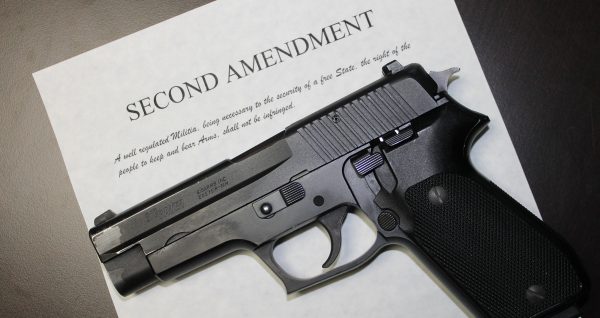
Did Elie Mystal, the Harvard-educated journalist and law school graduate, just shoot holes in any argument against a lawsuit scheduled for review by the U.S. Supreme Court challenging the restrictive gun permit laws in New York State?
Writing at The Nation about the case, gun control in New York and elsewhere, and not attempting to mask his pro-gun control sentiments, he might just have done that.
The case was brought by the New York State Rifle & Pistol Association (NYSRPA), and the whole country is watching because an affirmative ruling could jeopardize similar restrictive “good cause” requirements for obtaining carry permits in other states, including New Jersey, Maryland and California.
Every gun rights group in the country has submitted an amicus brief supporting the lawsuit, along with 175 members of Congress and several U.S. Senators. The lineup of support draws a distinctive line between two political parties, and two divided philosophies: those who believe the Second Amendment protects a fundamental individual right and those who do not, despite what the high court ruled in 2008 in District of Columbia v. Heller.
What Mystal acknowledged might be considered monumental. He seems to lament that gun owners and public defenders are in agreement that the state’s gun laws, and how they are enforced, is a travesty.
“The fact that these two interest groups have found common cause in obliterating state gun regulations is just a depressing example of why we can’t have nice things,” Mystal complains.
And then he appears to bite sour grapes: “What’s even more depressing is that the public defenders make an excellent case.”
That seems suspiciously like an admission they may be correct, and Mystal just doesn’t like it.
The capper comes a few lines later as Mystal explains, “The public defenders calculate that it costs around $400 to get a gun permit in New York, plus a whole lot of time that is disproportionately difficult for the working poor to find. I don’t tend to think of private gun ownership as a constitutional right, but if you do, gating access to that right behind a $400 fee and an enormous time sink is not something we do for other constitutional principles.”
Mystal can think whatever he pleases—and he’s got plenty of company in the billionaire-backed gun prohibition lobbying effort—but he didn’t make up the rules, the Founders did, and their concept has been upheld by the Supreme Court twice since the turn of this century.
Even more intriguing, Mystal seems to unintentionally admit to a bit of hypocrisy.
“The argument public defenders make against gun laws is exactly the same as the argument I and others have made against drug laws,” he complains in frustration. “Everything that has been said about the need to liberalize drug laws is being said by the public defenders about the need to liberalize gun laws. And the statistics totally back them up.”
Mystal’s lament in The Nation provides a better understanding of the disconnect between liberals and reality now at the core of a controversy at the far end of the country, in Seattle and Portland, the two bastions of far left politics in Washington and Oregon, respectively.
Homicides and violent crime are spiking in both cities, but the liberal leadership can’t figure out cause and effect. As noted by Seattle’s KOMO News—the local ABC affiliate—following a weekend of deadly mayhem that left five people dead, “With the uptick in gun violence, council members are also being reminded again, they slashed this year’s police budget by 18%.”
As observed in a headline at AmmoLand News about the problem in Oregon, “Portland OR in Chaos? Homicides Surge, But What Did City Expect?”
City governments in both metropolitan enclaves acquiesced to the demands of anarchists, Antifa and BLM protesters last year that police budgets be gutted. The result has been the loss of more than 250 officers in Seattle and at least 125 in Portland. Seattle’s body count so far is 28, while Portland reports 51 dead so far, and five months remain in 2021 to run those numbers higher.
What makes the New York case so pivotal is that it could put an end to governments requiring citizens to provide a “good reason” to exercise a constitutionally enumerated right. If it really is a right to keep and bear arms, citizens don’t need a reason to exercise it. On the other hand, the state would need a reason, and an extremely good one, to justify restricting it.